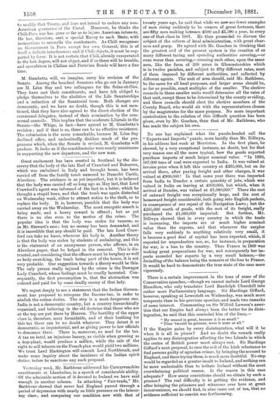No one has explained what the puzzle-headed call the "
Exports and Imports" puzzle, more lucidly than Mr. Dillwyn, in his address last week at Morriston. In the first place, he showed, by a very exceptional instance, no doubt, but for that very reason one all the more typical, how the goods exported purchase imports of much larger nominal value. "In 1880,. 587,000 tons of coal were exported to India. It was valued at invoice price when it left this country at £265,000, but on its arrival there, after paying freight and other charges, it was valued at £900,000 ! In that same year there was imported from India to Dundee a certain quantity of jute, which was valued in India on leaving at £900,000, but which, when it arrived at Dundee, was valued at £1,080,000." There the cost of outward freight was exceptionally large, and the cost of homeward freight considerable, both going into English pockets,. in consequence of our repeal of the Navigation Laws ; but the £265,000 worth of goods, with the cost of its freight, really purchased the £1,080,000 imported. But further, Mr. Dillwyn showed that in every country in which the trade- is increasing, the imports are of much higher nominal value than the exports, and that whenever the surplus falls very suddenly to anything relatively very small, it is because a good deal of capital has been exported, which, if exported for unproductive use, as, for instance, in preparation for war, is a loss to the country. Thus France in 1869 was making great preparations for war, and consequently her im- ports exceeded her exports by a very small balance,—the dwindling of the balance being the measure of the loss to France. It would be hard to demonstrate the true state of the case more vigorously.






































 Previous page
Previous page